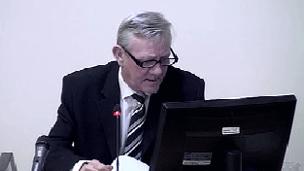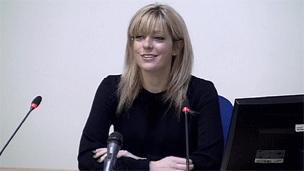Leveson Inquiry: Summary of week four
- Published

Much of the evidence referred to during Alex Owens's appearance was kept private
A lawyer representing celebrity victims of phone hacking and the former information commissioner were among those to give evidence to the Leveson Inquiry into media ethics.
The week started by hearing that a private detective was hired by journalists to uncover personal details about celebrities including actor Hugh Grant.
Inquiry counsel Robert Jay QC told the inquiry a "treasure trove" of data was found when Steve Whittamore's records were seized in 2003.
They were taken as part of the Information Commissioner's Office's inquiry into allegations of offences under the Data Protection Act by the British press, known as Operation Motorman.
Lord Justice Leveson decided it was not in the public interest to display the documents, which were discussed as part of evidence given by the ICO lead investigator Alexander (Alec) Owens - who was recalled to give evidence on Monday.
Mr Owens also reiterated a claim he made that he had urged former ICO deputy Francis Aldhouse and the then information commissioner Richard Thomas to go after the newspapers but that Mr Aldhouse had said the news groups were "too big" to tackle.
Mr Aldhouse later told the inquiry he could not recall the conversation - and if he had seen the information on the media's illegal accessing of data as it had been laid out to the inquiry his view would probably have been "we really ought to find a way of pursuing this".
He said he did not fear the media and that the comment attributed to him by Mr Owens did not reflect the way he had dealt with the media.
The inquiry later heard from the author of the book News of the World? Fake Sheikhs and Royal Trappings.
Peter Burden said the culture at the newspaper did not demand "the relevance of truth".
Some stories, he said, led to people being arrested and locked up on remand, before the case against them collapsed.

Ms Harris said media had been more careful during the Leveson Inquiry
On Tuesday the inquiry heard from lawyer Charlotte Harris, of law firm Mishcon de Reya.
She has represented phone-hacking victims including celebrity couple Leslie Ash and Lee Chapman and sports agent Sky Andrew. In 2010, the News of the World hired a private detective to follow her and fellow victims' lawyer Mark Lewis.
Ms Harris told the inquiry she was put under surveillance in a bid to discredit solicitors for alleged victims of phone hacking - and documents relating to the surveillance had mentioned her children, which made her "terribly uncomfortable".
The inquiry also heard from David Leigh, the Guardian's investigations editor.
Later, Steve Nott told the inquiry he had informed companies and organisations including Vodafone, the Daily Mirror and Scotland Yard about he discovered a security loophole that allowed people to access mobile phone voicemails using a default Pin code in 1999.
The inquiry did not sit on Wednesday but the following day heard evidence about journalistic ethics.
Professor Steven Barnett said many people entering the profession were initially quite "idealistic".
But the professor of communications from the University of Westminster said when journalism entered the workplace, especially at tabloid newspapers, they were told that if they did not do what was asked of them they could be replaced by other "young, willing recruits".
Angela Phillips, who runs the print journalism programmes at Goldsmiths, University of London, said some journalists "get trapped" working for tabloids as they pay more than other newspapers.
Under pressure
On Friday, the inquiry heard from former Information Commissioner Richard Thomas.
Mr Thomas criticised the former Prime Minister Gordon Brown for giving in to press pressure.
He said he had met him and urged him to introduce legislation which would be tougher than the Data Protection Act and would include a maximum two year prison sentence for people convicted of data theft.
He said Mr Brown warned him he would have to compromise or the bill would be dropped.
Mr Thomas said the legislation was later shelved.
But he also criticised the coalition government for failing to activate legislation which would impose tougher penalties on data theft offenders.
He said he understood his successor had been told the legislation would not be introduced until the government knew the outcome of the Leveson Inquiry.
Transcripts of the hearings are available on the Leveson Inquiry website, external.
- Published1 December 2011
- Published25 November 2011
- Published18 November 2011